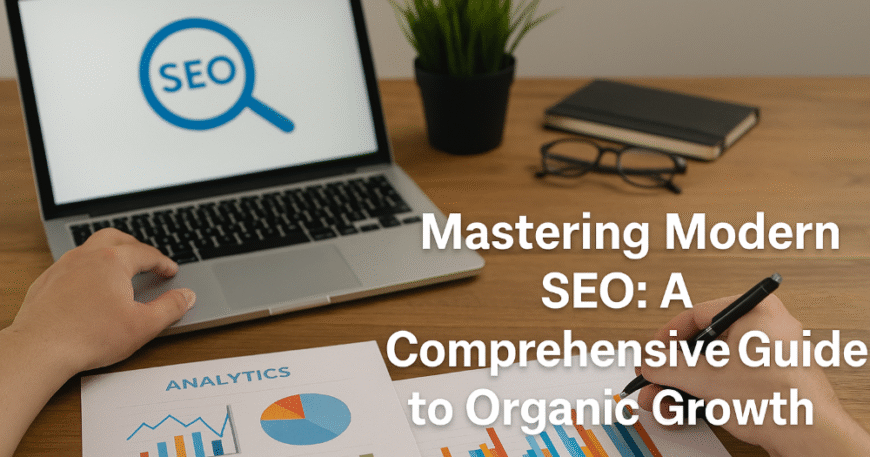
Table of Contents
- What Is SEO and Why Is It Important?
- The Foundations of SEO
- Types of SEO: On-Page, Off-Page, Technical
- The Changing Search Landscape
- Going Beyond Google: Omnisearch Optimization
- Differentiating SEO, Content Marketing & Inbound
- How Search Engines Work
- The Three SEO Pillars: Keywords, Content, Optimization
- Building Authority Through Off-Page SEO
- Final Thoughts
- FAQs
What Is SEO and Why Is It Important?
SEO refers to the practice of improving your website so that it appears higher in organic search engine results. The better your SEO, the more discoverable your content becomes to users actively searching for information, products, or services related to your offering.
It’s important to note that SEO isn’t about “tricking” search engines. It’s about aligning your content and website structure with what users genuinely want—clear answers, trustworthy information, and seamless experiences.
The Foundations of SEO
Think of SEO as a combination of strategy, structure, and storytelling. It requires understanding your audience, the way search engines crawl your site, and how to create content that provides real value.
There’s no single magic switch. Instead, SEO is a layered system of best practices that work together over time to build authority, relevance, and traffic.
Types of SEO: On-Page, Off-Page, Technical
On-Page SEO
On-page SEO deals with everything you control on your website—content, keyword use, HTML tags, internal links, and page structure. Good on-page SEO ensures that search engines (and users) can easily understand and navigate your content.
Off-Page SEO
This involves actions taken outside your website, such as acquiring backlinks from other credible sources, engaging in guest posts, or sharing content on social platforms to build domain authority.
Technical SEO
This focuses on how search engines access, crawl, and index your site. Technical SEO includes optimizing page speed, ensuring mobile responsiveness, using HTTPS, and submitting sitemaps.
The Changing Search Landscape
Search has evolved far beyond ten blue links on a Google page. People now use multiple platforms to find answers—from voice assistants like Alexa and Siri to social networks like TikTok, Reddit, and Pinterest.
Search intent is becoming more conversational and contextual. AI-powered tools like ChatGPT are also changing how people interact with information. Your SEO strategy must adapt by optimizing for these varied behaviors and touchpoints.
Going Beyond Google: Omnisearch Optimization
Omnisearch Optimization means ensuring your brand appears wherever people are searching—not just on Google. Whether it’s a how-to video on YouTube, a product question on Reddit, or a tip on Instagram, your content should be discoverable across platforms.
Each platform requires a slightly different approach, but the goal remains the same: provide clear, relevant, and engaging answers to user queries wherever they arise.

Differentiating SEO, Content Marketing & Inbound
These terms are often used interchangeably but serve distinct functions:
- SEO helps your content get found in search results.
- Content Marketing creates value through blogs, guides, videos, and more.
- Inbound Marketing attracts and nurtures leads by offering helpful resources instead of pushing sales.
While each strategy can stand alone, they work best when integrated. SEO fuels content visibility, content delivers value, and inbound strategies convert traffic into loyal customers.
How Search Engines Work
To rank your content, search engines go through three essential processes:
- Crawling: Bots scan web pages and gather data.
- Indexing: The collected data is organized and stored.
- Ranking: Search engines decide which pages are most relevant based on various factors like content quality, usability, and authority.
Understanding this process allows you to align your SEO practices with how search engines think.
The Three SEO Pillars: Keywords, Content, Optimization
Keywords
Keywords are the terms people enter into search engines. But SEO today is less about stuffing terms and more about understanding user intent. Tools like Google Keyword Planner or Ubersuggest help identify high-potential phrases.
Important factors to consider include:
- Search volume
- Keyword difficulty
- Relevance to your audience
Focus on long-tail keywords and related clusters to build depth and authority.
Content
High-quality content is the backbone of any SEO strategy. It must be original, useful, and aligned with your audience’s questions or needs. Google values expertise, authority, and trustworthiness—collectively known as E-A-T.
Types of effective SEO content:
- In-depth blog posts
- Tutorials and how-tos
- Case studies
- Infographics
- Videos and podcasts
Optimization
Once content is created, you need to ensure it’s technically sound. Key elements include:
- Fast loading times
- Mobile-friendly design
- Logical internal linking
- Alt text for images
- Proper URL and heading structures
- Descriptive title tags and meta descriptions
Each of these elements helps search engines understand and index your content more effectively.
Final Thoughts
SEO is no longer just a technical practice—it’s a digital marketing essential. It influences how your brand is discovered, perceived, and trusted. Whether you’re running a business, blog, or portfolio, investing in SEO ensures your message reaches the right audience.
As search engines and user behavior continue to evolve, staying informed and adaptable is key. Remember, the most effective SEO strategies prioritize value, clarity, and credibility.
FAQs
Q1. How long does it take for SEO to show results?
SEO is a long-term strategy. Typically, noticeable improvements in rankings and traffic can be seen within 3 to 6 months, but it can vary depending on competition and consistency.
Q2. Can I do SEO without hiring an expert?
Yes, many aspects of SEO can be self-taught using tools like Yoast SEO, Google Search Console, or Ahrefs. However, for more competitive industries or technical audits, expert help can accelerate results.
Q3. Does social media impact SEO rankings?
While social shares don’t directly influence search rankings, content that performs well on social media tends to earn more backlinks and engagement—both of which positively affect SEO.



